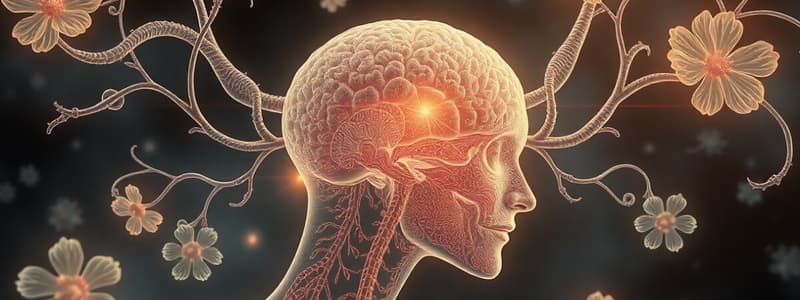Podcast
Questions and Answers
Welches Hormon wirkt auf die Nebennierenrinde ein?
Welches Hormon wirkt auf die Nebennierenrinde ein?
- STH
- ACTH (correct)
- FSH
- TSH
Welche der folgenden Aussagen über die Hypophyse ist falsch ?
Welche der folgenden Aussagen über die Hypophyse ist falsch ?
- Die Hypophyse produziert direkt Einfluss nehmende Hormone wie FSH und LH.
- Die Hypophyse besteht aus dem Vorder- und Hinterlappen.
- Die Hypophyse ist für die Produktion von Thyroxin verantwortlich. (correct)
- Die Hypophyse wird vom Hypothalamus gesteuert.
Welches Hormon wird im Hypothalamus gebildet und in der Hypophyse gespeichert?
Welches Hormon wird im Hypothalamus gebildet und in der Hypophyse gespeichert?
- ADH (correct)
- Testosteron
- Östrogen
- Cortisol
Welche der folgenden Aussagen trifft auf endokrine Drüsen zu?
Welche der folgenden Aussagen trifft auf endokrine Drüsen zu?
Welche der folgenden Aussagen beschreibt die parakrine Wirkung von Hormonen?
Welche der folgenden Aussagen beschreibt die parakrine Wirkung von Hormonen?
Welche Hormone werden von den Gonaden produziert?
Welche Hormone werden von den Gonaden produziert?
Welche der folgenden Aussagen über die Steuerung der Hormonausschüttung ist richtig ?
Welche der folgenden Aussagen über die Steuerung der Hormonausschüttung ist richtig ?
Welches Hormon fördert die Produktion von Thyroxin (T4) und Trijodthyronin (T3)?
Welches Hormon fördert die Produktion von Thyroxin (T4) und Trijodthyronin (T3)?
Welche Hormone werden von der Hypophyse nicht beeinflusst?
Welche Hormone werden von der Hypophyse nicht beeinflusst?
Welches Hormon wird von der Nebenniere freigesetzt und ist für die Stressreaktion zuständig?
Welches Hormon wird von der Nebenniere freigesetzt und ist für die Stressreaktion zuständig?
Insulin wirkt sich auf den Blutzuckerspiegel aus, indem es...
Insulin wirkt sich auf den Blutzuckerspiegel aus, indem es...
Welche der folgenden Organe produziert keine Hormone?
Welche der folgenden Organe produziert keine Hormone?
Auf welche Organe wirken hypophysäre Hormone?
Auf welche Organe wirken hypophysäre Hormone?
Steuerhormone bilden periphere Hormone und diese wirken in verschiedenen Zielgeweben des Körpers.
Steuerhormone bilden periphere Hormone und diese wirken in verschiedenen Zielgeweben des Körpers.
Was sind Hormone?
Was sind Hormone?
Welche Stoffe werden im Hypothalamus gebildet? (Wählen Sie die korrekten Optionen aus)
Welche Stoffe werden im Hypothalamus gebildet? (Wählen Sie die korrekten Optionen aus)
Flashcards
Parakrine Wirkung
Parakrine Wirkung
Hormone, die nur auf umliegende Zellen wirken, nicht auf entfernte Organe.
Adrenalin
Adrenalin
Ein Hormon des Nebennierenmarks, das die Stressreaktion fördert.
Erythropoietin
Erythropoietin
Hormon, das in der Niere produziert wird und die Blutbildung fördert.
Insulin
Insulin
Signup and view all the flashcards
Typ I Diabetes
Typ I Diabetes
Signup and view all the flashcards
Typ II Diabetes
Typ II Diabetes
Signup and view all the flashcards
Parathormon (PTH)
Parathormon (PTH)
Signup and view all the flashcards
Calcitonin
Calcitonin
Signup and view all the flashcards
Hormone
Hormone
Signup and view all the flashcards
Hypothalamisch-hypophysäres System
Hypothalamisch-hypophysäres System
Signup and view all the flashcards
Releasing-Hormone (RH)
Releasing-Hormone (RH)
Signup and view all the flashcards
Hypophyse
Hypophyse
Signup and view all the flashcards
Endokrine Drüsen
Endokrine Drüsen
Signup and view all the flashcards
Exokrine Drüsen
Exokrine Drüsen
Signup and view all the flashcards
Steuerhormone
Steuerhormone
Signup and view all the flashcards
Study Notes
Physiologie FK Hormone
- Hormone: Chemical messengers that act slowly and long-term. They are produced in endocrine glands and travel through the circulatory system to target cells, where they exert their effects via receptors.
Hormonal Regulation in the Hypothalamic-Pituitary System
- Hypothalamic-Pituitary Axis: A neural signal triggers the release of releasing hormones (RH) in the hypothalamus. These hormones stimulate the pituitary gland, which then releases tropic hormones. These tropic hormones impact peripheral endocrine glands, which release the "actual" hormones into the bloodstream. Once sufficient hormone levels are reached, a negative feedback loop stops further production.
Hypothalamus and Pituitary Gland Hormone Production
-
Hypothalamus: Produces releasing hormones (RH) and inhibiting hormones (IH) that regulate the pituitary. Also produces antidiuretic hormone (ADH) for water reabsorption in the kidneys and oxytocin for uterine contractions and milk ejection.
-
Anterior Pituitary: Produces hormones such as follicle-stimulating hormone (FSH), luteinizing hormone (LH), thyroid-stimulating hormone (TSH), adrenocorticotropic hormone (ACTH), growth hormone (GH), and prolactin.
-
Posterior Pituitary: Stores and releases ADH and oxytocin, although both are produced in the hypothalamus.
Peripheral Hormone Actions
-
Gonads: FSH and LH stimulate estrogen, progesterone, and testosterone production, impacting sexual development and bone metabolism.
-
Thyroid: TSH stimulates thyroxine (T4) and triiodothyronine (T3) production, affecting growth and metabolism.
-
Adrenal Cortex: ACTH stimulates the production of glucocorticoids (e.g., cortisol), regulating metabolism and electrolyte balance.
Endocrine vs. Exocrine Glands and Cells
-
Endocrine Glands: Release hormones directly into the bloodstream (e.g., thyroid, adrenal glands).
-
Exocrine Glands: Release substances through ducts to exterior surfaces (e.g., sweat glands).
-
Endocrine Cells: Scattered throughout organs, they influence distant target organs via hormones released into the bloodstream.
Other Hormones
-
Paracrine Action: Hormones that have local effects, influencing only adjacent cells, rather than distant targets via the bloodstream.
-
Hypothalamic-independent Hormones: These are hormones produced by organs outside of the hypothalamic-pituitary axis. Examples include adrenaline from the adrenal medulla and erythropoietin from the kidney.
Diabetes Mellitus
-
Type 1 Diabetes: Characterized by a lack of insulin due to autoimmune destruction of insulin-producing cells.
-
Type 2 Diabetes: Insulin resistance, which can result in a reduction in insulin production.
Calcium Metabolism
-
Parathyroid Hormone (PTH): Released by the parathyroid glands when blood calcium levels are low, increasing calcium levels in the blood through bone resorption, increased renal reabsorption, and Vitamin D activation.
-
Calcitonin: Released from the thyroid gland when calcium levels are high, decreasing calcium levels in the blood through inhibiting bone resorption.
Vitamin D
- Vitamin D3 (Cholecalciferol): Produced in the skin via UV light, or obtained through diet; it is converted in the liver to calcidiol, and then to calcitriol in the kidneys.
- Calcitriol: The active form of vitamin D; increases calcium absorption in intestines and calcium reabsorption in the kidneys. Also influences bone metabolism.
Studying That Suits You
Use AI to generate personalized quizzes and flashcards to suit your learning preferences.




